

Economics. For a topical guide to this subject, see Outline of economics.
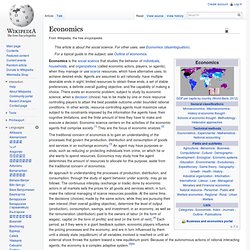
Economics is the social science that studies the behavior of individuals, households, and organizations (called economic actors, players, or agents), when they manage or use scarce resources, which have alternative uses, to achieve desired ends. Agents are assumed to act rationally, have multiple desirable ends in sight, limited resources to obtain these ends, a set of stable preferences, a definite overall guiding objective, and the capability of making a choice. There exists an economic problem, subject to study by economic science, when a decision (choice) has to be made by one or more resource-controlling players to attain the best possible outcome under bounded rational conditions. Anthropology. Anthropology /ænθrɵˈpɒlədʒi/ is the study of humankind, past and present,[1][2] that draws and builds upon knowledge from social and biological sciences, as well as the humanities and the natural sciences.[3][4] Since the work of Franz Boas and Bronisław Malinowski in the late 19th and early 20th centuries, anthropology in Great Britain and the US has been distinguished from ethnology[5] and from other social sciences by its emphasis on cross-cultural comparisons, long-term in-depth examination of context, and the importance it places on participant-observation or experiential immersion in the area of research.
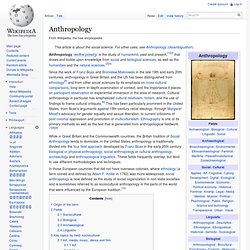
In those European countries that did not have overseas colonies, where ethnology (a term coined and defined by Adam F. Origin of the term[edit] The term anthropology originates from the Greek anthrōpos (ἄνθρωπος), "human being" (understood to mean humankind or humanity), and -λογία -logia, "study. " Fields[edit] According to Clifford Geertz,
Education. School children sitting in the shade of an orchard in Bamozai, near Gardez, Paktya Province, Afghanistan A right to education has been recognized by some governments.

At the global level, Article 13 of the United Nations' 1966 International Covenant on Economic, Social and Cultural Rights recognizes the right of everyone to an education.[2] Although education is compulsory in most places up to a certain age, attendance at school often isn't, and a minority of parents choose home-schooling, e-learning or similar for their children. Etymology[edit] Etymologically, the word "education" is derived from the Latin ēducātiō ("A breeding, a bringing up, a rearing") from ēdūcō ("I educate, I train") which is related to the homonym ēdūcō ("I lead forth, I take out; I raise up, I erect") from ē- ("from, out of") and dūcō ("I lead, I conduct").[3] Education can take place in formal or informal educational settings.
History[edit] Nalanda, ancient center for higher learning. Psychology. Psychology is an academic and applied discipline that involves the scientific study of mental functions and behaviors.[1][2] Psychology has the immediate goal of understanding individuals and groups by both establishing general principles and researching specific cases,[3][4] and by many accounts it ultimately aims to benefit society.[5][6] In this field, a professional practitioner or researcher is called a psychologist and can be classified as a social, behavioral, or cognitive scientist.
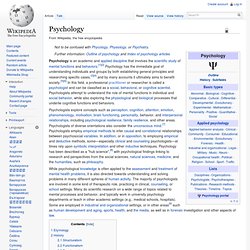
Psychologists attempt to understand the role of mental functions in individual and social behavior, while also exploring the physiological and biological processes that underlie cognitive functions and behaviors. While psychological knowledge is often applied to the assessment and treatment of mental health problems, it is also directed towards understanding and solving problems in many different spheres of human activity.
Etymology History Structuralism Functionalism Psychoanalysis Behaviorism Humanistic. Political science. Political science is a social science discipline that deals with systems of government and the analysis of political activity and political behavior.[1] It deals extensively with the theory and practice of politics which is commonly thought of as the determining of the distribution of power and resources.
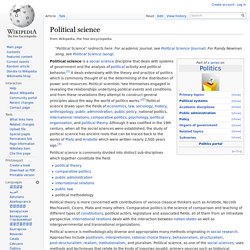
Political scientists "see themselves engaged in revealing the relationships underlying political events and conditions, and from these revelations they attempt to construct general principles about the way the world of politics works. Public administration. Public administration is both an academic discipline and a field of practice; the latter is depicted in this picture of US federal public servants at a meeting.

Public administration refers to two meanings: first, it is concerned with the implementation of government policy; second, it is an academic discipline that studies this implementation and prepares civil servants for working in the public service.[1] As a "field of inquiry with a diverse scope" its "fundamental goal... is to advance management and policies so that government can function.
Social science. Social science is an academic discipline concerned with society and the relationships among individuals within a society. Linguistics. In the early 20th century Ferdinand de Saussure distinguished between the notions of langue and parole in his formulation of structural linguistics.
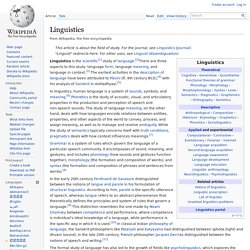
According to him, parole is the specific utterance of speech, whereas langue refers to an abstract phenomenon that theoretically defines the principles and system of rules that govern a language.[9] This distinction resembles the one made by Noam Chomsky between competence and performance, where competence is individual's ideal knowledge of a language, while performance is the specific way in which it is used.[10] In classical Indian philosophy of language, the Sanskrit philosophers like Patanjali and Katyayana had distinguished between sphota (light) and dhvani (sound). In the late 20th century, French philosopher Jacques Derrida distinguished between the notions of speech and writing.[11] Nomenclature[edit] History of communication studies. Various aspects of communication have been the subject of study since ancient times, and the approach eventually developed into the academic discipline known today as communication studies.
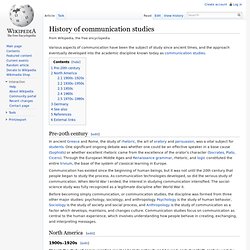
Pre-20th century[edit] Communication has existed since the beginning of human beings, but it was not until the 20th century that people began to study the process. As communication technologies developed, so did the serious study of communication. When World War I ended, the interest in studying communication intensified. The social-science study was fully recognized as a legitimate discipline after World War II. Communication studies. History[edit] Other names[edit] Communication studies programs at universities are given various names, including "communication", "communication studies", "speech communication", "rhetorical studies", "communication sciences", "media studies", "communication arts", "mass communication", "media ecology," and "communication and media science.

" The curriculum varies based upon concentration. [clarification needed] Scope[edit] Communication studies integrates aspects of both social sciences and the humanities. A focus on research development sets communication studies apart from general communication degrees. Law. "Legal concept" redirects here.
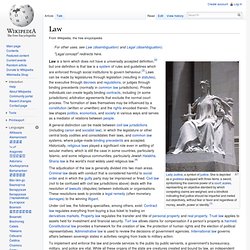
Lady Justice, a symbol of justice. She is depicted as a goddess equipped with three items: a sword, symbolising the coercive power of a court; scales, representing an objective standard by which competing claims are weighed; and a blindfold indicating that justice should be impartial and meted out objectively, without fear or favor and regardless of money, wealth, power or identity.[1] Law is a term which does not have a universally accepted definition,[2] but one definition is that law is a system of rules and guidelines which are enforced through social institutions to govern behaviour.[3] Laws can be made by legislatures through legislation (resulting in statutes), the executive through decrees and regulations, or judges through binding precedents (normally in common law jurisdictions). Private individuals can create legally binding contracts, including (in some jurisdictions) arbitration agreements that exclude the normal court process.
History. Those who cannot remember the past are condemned to repeat it.[1] History (from Greek ἱστορία, historia, meaning "inquiry, knowledge acquired by investigation")[2] is the study of the past, particularly how it relates to humans.[3][4] It is an umbrella term that relates to past events as well as the memory, discovery, collection, organization, presentation, and interpretation of information about these events. Scholars who write about history are called historians. Events occurring prior to written record are considered prehistory.
History. WW2 History. WWII. Geography. Geography (from Greek γεωγραφία, geographia, lit. "earth description"[1]) is a field of science dedicated to the study of the lands, the features, the inhabitants, and the phenomena of the Earth.[2] A literal translation would be "to describe or write about the Earth". The first person to use the word "geography" was Eratosthenes (276–194 BC).[3] Four historical traditions in geographical research are spatial analysis of the natural and the human phenomena (geography as the study of distribution), area studies (places and regions), study of the man-land relationship, and research in the Earth sciences.[4] Nonetheless, modern geography is an all-encompassing discipline that foremost seeks to understand the Earth and all of its human and natural complexities - not merely where objects are, but how they have changed and come to be.
David Rumsey Historical Map Collection. The Histomap. Four Thousand Years Of World History. Relative Power Of Contemporary States, Nations And Empires. Copyright by John B. Sparks. Published by Histomap, Inc. Chicago, Ill. Printed and distributed in the U.S.A. by Rand McNally & Co., Chicago, Il.